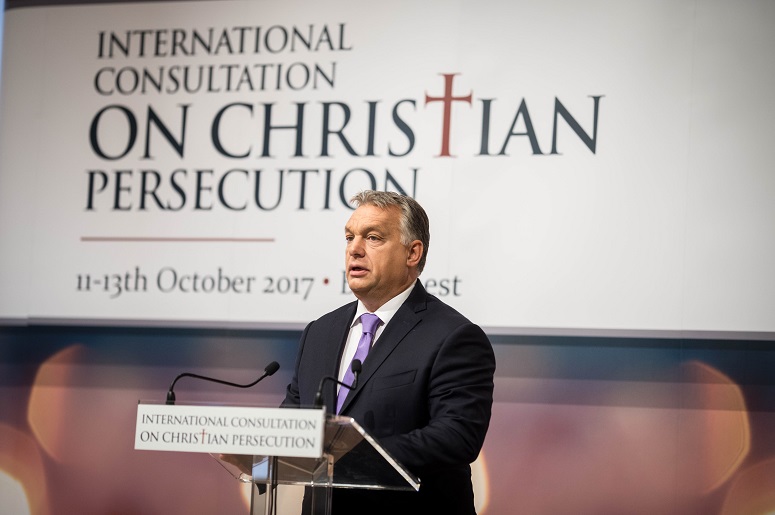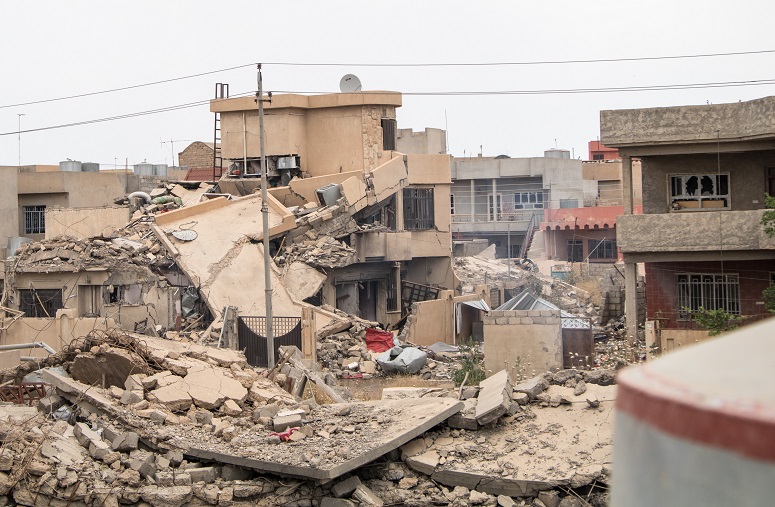
Referring to his country’s experience of oppression during the Soviet Union era, the Hungarian Prime Minister has once again explained why his government has been the first – and so far the only – government to specifically address the persecution of Christians around the world.
Yesterday (12 October) he pledged to support Middle Eastern Christians, under threat of being wiped out from the area where Christianity started, to stay in the lands of their birth. “We’ll do what the local community leaders think we should do, which is to give help to returnees to go back to their ancestral homes,” Viktor Orbán said.
“Four out of every five people who are oppressed because of their faith are Christians. In 2015 in Iraq, a Christian was murdered every five minutes because of their religious beliefs.”
Viktor Orbán
Orbán was speaking at a conference his government is hosting in the Hungarian capital, Budapest. He told the audience: “It is a fact that Christianity is the most persecuted religion in the world today. In view of the fact that 215 million Christians in 108 countries currently suffer from various forms of persecution, four out of every five people who are oppressed because of their faith are Christians, and in 2015 in Iraq, a Christian was murdered every five minutes because of their religious beliefs.”
The number of Christians in Iraq has dropped from 1.5 million before the Allied invasion of Iraq in 2003 to about 250,000 today. In Syria, the numbers are harder to estimate, but it is estimated that 50% of the Christian population have fled the country.
The conference has brought together church leaders from the Middle East, Europe and the US – together with NGO activists and parliamentarians from places such as Canada and Sweden – to, in its own title, ‘Find the Appropriate Answers to a Long Neglected Crisis’. About 350 attendees of the ‘International Consultation on Christian Persecution’ have heard how Hungary finds itself alone among nations in setting up a government unit dedicated to addressing the needs of this most persecuted minority.
Even before that happened a year ago, the government had co-financed the building of a school in Erbil, where around 80,000 Christians had fled the Iraqi Nineveh Plains invasion by IS three years ago.

Then, after meeting key church leaders from the Middle East in Rome in August 2016, and hearing their accounts of the worsening situation in their regions, Orbán and the Minister for Human Capacities, Zoltán Balog – whose wide portfolio includes Sport, Tourism and other issues – agreed to set up a new Deputy State Secretariat “for the Aid of Persecuted Christians”: to, in its words, “support Christians facing violence and oppression around the world”. It has secured three million Euros for this goal.
A North Korean now resident in the UK, Nigerian students from Maidugiri in Borno State, a Pakistani university lecturer and disability activist, and a Kenyan female entrepreneur are amongst the conference participants.
But the focus of this first conference is clearly on what the EU Parliament declared in spring 2016 as “genocide” of Christians and Yazidis in the Middle East, and how the international community needs to act to prevent these ancient faiths from being consigned to the museum of history.
“Now Qaraqosh is liberated, but our home was completely burned to ashes. Despite these heavy circumstances, people have started to rebuild. But overall, it’s still unstable.”
Immediately before Orbán addressed the conference, it heard from a young man in northern Iraq. He told how his father had been injured by a roadside bomb when they lived in Baghdad. At school, the boy had been taunted for his minority Christian faith, once at knife-point.
“There was a threat to Iraqi Christians. They called us infidels,” the young man said. “There were bombings and terrorist attacks every day. Two university students I knew were killed. So from 2006-14 we went to live in Qaraqosh. Then, one Thursday in August, when IS conquered [the Nineveh Plains], we fled to Ankawa, in Erbil [Kurdistan]. Our exit was difficult as we didn’t have a car… It’s 60km: we had no choice but to walk. Midway, a local man appeared with a small bus and took us all to Ankawa – it was an answer to prayer.
“Now Qaraqosh is liberated, but our home was completely burned to ashes. Despite these heavy circumstances, people have started to rebuild. But overall, it’s still unstable.”

It is young men like him whom the Hungarian Deputy State Secretariat aims to support. Constant themes in the conference have been the need to provide education for displaced (and now returning) children, and also employment opportunities. As the Metropolitan of Mosul, Nicodemus Sharaf, explained: “Because if their children have no schools and their youths no work, the Christians will not choose to return, and will consider life in Europe or elsewhere.”
The conference has been frequently reminded that despite a lot of talk from “politicians of goodwill”, the Hungarian government is the only one to have acted to target support directly through local churches, giving 1.9 million Euros towards the rebuilding of 200 homes in Tel Skuf in northern Iraq. It has also bought six months’ medical supplies for a hospital in Erbil.
Much has been made of the urgency of the needs of Middle East Christians in particular, which the government, together with the ecumenical charity Hungary Helps, seeks to meet. In one panel session, reference was made to one European Foreign Minister who said: “Perhaps we can organise a conference in 2018.” The key patriarchs who are in Budapest are afraid this may be too late, especially given the added recent tensions of the Kurdish referendum, and the fact that some of the liberated villages are now controlled by Iranian-backed and Kurdish militias, which threaten their multi-cultural, multi-faith nature.
Plenary speaker Nina Shea told the conference that the Iranians have already built an elementary school in one of the Christian villages, Bartella, a school named after the revolutionary leader Ayatollah Khomeini. Tehran has also opened a mosque and a library in the same village.
Apart from reconstruction in the Nineveh Plains and in Syria, the Deputy Secretariat’s other main project is a scholarship programme, which in September brought 80 or so young Catholics – from countries such as Nigeria, Egypt, Iraq, Syria, Pakistan and Jordan – to study in Hungary. Scholars have to be recommended by their local church, and must promise to return to help build up their country. The number of scholarships is expected to expand to 250 in 2018.
The Deputy State Secretariat says “it is determined to co-ordinate at a higher level the humanitarian aid provided to Christian communities at risk and raise the awareness of the wider European audience by means of analysis and central documentation of the phenomenon of the persecution of Christians”.
Minister Balog, a theologian by background who originally had no political ambitions, has been entrusted with this portfolio by Prime Minister Orbán. While some might choose to see Orbán as aware of the need to court votes ahead of the next election in spring 2018, the conference has shown that Balog, a Protestant Church leader himself, is tackling an issue which, for some Hungarians, may not always be an easy sell. As with most domestic populations, many Hungarians might be tempted to say, as the conference heard, “We’re struggling here, and charity begins at home.”
This conference, while constantly emphasising that it has made a start, calls, in Orbán’s own words, “for others in places that are stronger, larger … that should bear a larger, more significant responsibility, to act, not just discuss”.
